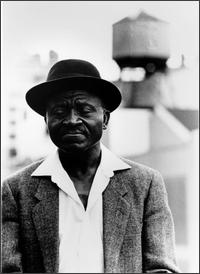|
S.t.u.d.i.o..M
 |
BOJAN ZULFIKARPASIC
France |
 |
JAZZ PISTOLS.
Germany |
 |
VASIL HADZIMANOV BAND
Yugoslavia |
 |
BOSKO PETROVIC TRIO
Croatia |
 |
VLADIMIR MARAS & BAND
Yugoslavia |
 |
BIG
BAND RTV SLOVENIJA Slovenia |
 |
TRUMPET SUMMIT
USA-Yugoslavia-Slovenia |
 |
MATIJA DEDIC TRIO
Croatia |
 |
BEEFUNK
Austria |
 |
ALEKSANDAR MILOSEVIC QUARTET
Holland |
 |
RAINER, RUSKUZ & WESP
YU-Austria-Germany |
 |
CRISS-CROSS
Austria |
Youth Theatre
Scena
Club
 |
HEDY LAMARR
Yugoslavia |
 |
HAVONA
Yugoslavia |
SNP - Trema
Club
 |
O
Ke CONNECTION
Yugoslavia |
|
J.A.M..S.E.S.S.I.O.N
|
HOUSE BAND
Yugoslavia |
 | ...
..
p r o d u c t i o n
 |
C C N S |
 ....M O N D A Y
- N O V E M B E R 25th 2002
- 10:00 p.m. - S t u d i o
M ....M O N D A Y
- N O V E M B E R 25th 2002
- 10:00 p.m. - S t u d i o
M |
| ANDY
BEY |
 |
| ................................................... |
ANDY
BEY vocal, piano - USA
One of the great unsung heroes of jazz singing, Andy Bey is a
commanding interpreter of lyrics who has a wide vocal range and a
big, rich, full voice. Bey enjoys a small following that swears by
him; nonetheless, he isn't nearly as well known as he should be.
Born and raised in Newark, NJ, not far from New York, Bey was
exposed to jazz as a child and started singing in front of local
audiences as early as eight. At some gigs, an eight-year-old Bey was
accompanied by tenor sax great Hank Mobley. Bey was 13 when, in
1952, he recorded his first solo album, Mama's Little Boy's Got the Blues; and he was 17 when he formed Andy & the Bey
Sisters with his siblings Salome and Geraldine in 1956. The group
did a 16-month tour of Europe and recorded three albums (one for RCA
Victor in 1961, two for Prestige in 1964 and 1965) before breaking
up in 1967. In the 1960s and 1970s, Bey's vocals were featured by
Max Roach, Duke Pearson, and Gary Bartz (for whom he delivered very
socio-political lyrics, including some searing condemnations of U.S.
involvement in the Vietnam War). The 1970s also found Bey recording
Experience and Judgment for Atlantic and beginning a long
association with pianist Horace Silver, who featured him prominently
on many of the religious-theme albums he put out own his own Silveto
label in the 1970s and 1980s. The LPs contained what Silver termed
"metaphysical self-help music" and preached a sort of religious
self-help philosophy that wasn't unlike Reverend Ike's message --
unfortunately for Silver and Bey, this approach meant limited
distribution and little commercial appeal. Bey continued to work
with Silver into the 1990s, when he was featured on Silver's 1993
Columbia date It's Got to Be
Funky (which marked a return to hard
bop's mainstream and did much better commercially than his
"self-help music"). Labels Bey recorded for as a leader in the 1980s
and 1990s included Jazzette, Zagreb, and Evidence, which, in 1996,
released the superb Ballads, Blues and
Bey.
(Alex
Henderson, All Music Guide) |
.
.
.
|
c o n c e r t i n c o l l a b
o r a t i o n w i t h
: |
|
U.S.
Embassy | | |